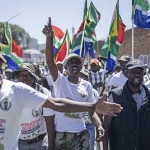“Nothing for you Winnie,” Mandela sidelines Winnie in his humble will.
Published on February 4, 2014 at 12:39 PM by FACE OF MALAWI
Nelson Mandela left money in his will to children and grandchildren, staff and the African National Congress (ANC) but gave nothing to his ex-wife Winnie Madikizela-Mandela, it has emerged.
The family of South Africa’s first black president, who died two months ago aged 95, gathered behind closed doors yesterday at his foundation in Johannesburg to hear the reading of the will, which carves up an estate estimated at 46m rand (£2.52m).
The most conspicuous omission was Madikizela-Mandela, his wife of 38 years during the struggle against racial apartheid. They divorced in 1996 but became close again towards the end of his life and, along with his third wife, Graça Machel, she was at his bedside when he died.
It also emerged that the former president’s daughters, each given $300,000 (£184,000) by him during his lifetime, get no further money now. But Machel’s children and six stepchildren, as well as nine of his staff, all share in his inheritance.
The publication of the will follows a turbulent year of public rows over his estate involving members of the Mandela family, even as their patriarch lay on his deathbed. While the “provisional inventory” of 46m rand appears relatively modest for a global statesman of such stature, the executors of Mandela’s estate said they could not answer questions regarding the destiny of three trusts, which are believed to hold considerably more wealth.
A source close to the process said its eventual disbursement could prove “a massive, treacherous area”, adding: “It could still end up in court. The trusts could be dissolved and the funds in them would go to the family members.”
Mandela married three times and his numerous children and grandchildren have frequently clashed over who leads the family and who should benefit from his lucrative “brand”. Last year, two of his daughters went to court to dispute control over the millions contained in one of the trusts but eventually dropped the action.
The will, first written in 2004 and last amended in 2008, has always been seen as a potential flashpoint. One executor, Dikgang Moseneke, the deputy chief justice of South Africa’s constitutional court, said the reading of the will to the family had been “charged with emotion” but no one had yet contested it. “There were clarifications sought from time to time,” he added.
Mandela’s children each received $300,000 in loans during his lifetime and will have that debt scrapped if it has not been repaid, according to a 40-page summary of the will.
His eldest grandson, Mandla, who has had several brushes with the law, receives $300,000 but only if approved by a family trust, whereas some of the other grandchildren will have their inheritances paid directly.
However, Mandela’s eldest granddaughter, Ndileka, also receives nothing now because of a previous loan. “The only reaction you can have is to accept the content of the will,” she said. “It’s the last testament of a person who died. There’s no disappointment. It is what it is.”
Asked if other family members were disappointed, she replied: “I will speak on my behalf. I’m fine with things the way they are. Everybody should work for their own wealth. Anything you get in a will is a bonus.”
Lawyers said Machel is likely to waive her right by marriage to half the Mandela estate, opting instead to receive four properties in Mozambique and other assets including cars and jewellery. If she does so, the two children she had with the late Mozambican president Samora Machel will receive 3m rand each from Mandela’s will, and six children from Samora Machel’s previous marriage will inherit 100,000 rand each.
Royalties from Mandela’s books, including his autobiography Long Walk to Freedom, and other projects, as well as his homes in Johannesburg, Cape Town, Qunu and Mthatha were left to a family trust.
Three executors will now be tasked with winding up the estate and carrying out Mandela’s wishes: Moseneke, George Bizos, a lawyer and friend of Mandela for 65 years, and Themba Sangoni, the chief judge in Eastern Cape province, where Mandela was born.
A tearful Bizos said he was not surprised that the assets were small compared with some of African history’s more egregious rulers. “Mr Mandela said: ‘If you want to please me, build a school or, if you have the money, build a school and a clinic.’ That makes him different from people in South Africa or elsewhere where people seek favours for their own benefit … The will was a summary of his wishes throughout his life so there was no surprise there.”
He described the reading of the will as very civilised and a good meeting. Asked if he thought it would mark the end of the family feuds, Bizos replied: “I hope so.”


